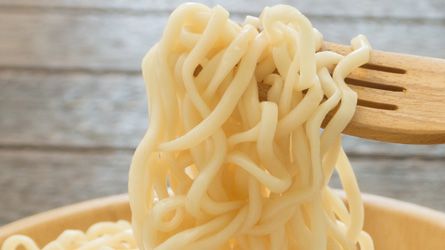
Press release -
Instant noodles loaded with salt
Researchers tested 765 noodle products collected from 10 countries between 2012 and 2016. The results showed huge variations in the amount of salt in instant noodles both within and between countries, with some noodle products containing 30 times more salt than others.
While noodles in China contain the most salt, levels in South Africa’s noodles are eighth highest, with an average packet (72 grams) containing 45% of the daily recommend maximum intake. The World Health Organization recommends that adults eat less than 5 grams of salt a day. Ref table 1 at the end of this release for the full research results.
Clare Farrand, public health nutritionist at The George Institute, said the findings were disturbing given that 270 million servings of noodles are consumed worldwide every day. “We know that instant noodles contain salt. However, it’s shocking to see just how much salt is in a single packet.”
Eating too much salt is estimated to cause about 1.65 million deaths a year globally.
People generally eat more than the recommended serving size
Farrand added, “What is more worrying is that in reality people tend to eat the entire packet of noodles, rather than just the recommended serving size, eating even more salt than what is advertised.”
The research further highlights how inconsistent and confusing nutrition labels are. Some companies label salt per serving, some per 100 grams as prepared and some per 100 grams as sold – making it almost impossible to compare.
Information on noodle packs can be incredibly misleading, as standard serving sizes, pack sizes, and amount of water manufacturers recommend to add vary considerably.
She says information should be given in a clear and consistent way to enable people to make a healthier choices. Manufacturers should also reduce salt levels in noodles to below agreed targets.
High salt intake linked to cardiovascular disease and stroke
In South Africa, 6.3 million people live with high blood pressure. We have one of the highest rates of hypertension worldwide – 130 heart attacks and 240 strokes occur daily. This means that 10 people suffer a stroke and five people have a heart attack every hour.
Candice Smith, Head of Vitality’s nutrition strategy, says eating patterns with a high salt content increase blood pressure and are linked to cardiovascular disease and stroke. “Reducing salt intake by 2 grams a day could reduce cardiovascular events by 20%. Reducing salt intake at a population level to the recommended 5 grams (one teaspoon) a day can help reduce the pressure on the health system and have large, positive public health effects”, she says.
Vitality’s guidelines on salt reduction
The average salt intake in South African adults is estimated to be 8.1 grams per day, with bread the single highest contributor to the total salt intake of South Africans.
“A goal for Vitality is to reach a 30% improvement towards the recommended intake of fruit and vegetables, and sugar and salt (sodium) by adult Vitality members by 2018,” says Smith. This goal has even greater importance when considering that between now and 2030, it is estimated that there will be a 17% increase in deaths caused by chronic conditions related to lifestyle.
Vitality’s current food guidelines take a total approach to eating patterns, encouraging the consumption of a variety of food, including whole foods that are minimally processed; high in fibre, micronutrients and good energy; and low in added salt, certain fats and sugar. Diets low in fruit and vegetable intake have also been associated with certain cancers, including stomach and colorectal cancer.
The Discovery Vitality HealthyFood Studio aims to combat the subsequent long-term health damage caused by poor diet by putting the fun back into the kitchenso that individuals and families experience the pleasure of creating meals and making healthier food choices in the process.
Tips for reducing salt intake
The George Institute report and Vitality suggest the following practical ways for reducing salt intake in noodles:
- The flavour sachet that comes with instant noodles contains most of the salt. Ditch it and add your own herbs, spices, garlic, lemon juice or fresh, chopped chili.
- Drain your noodles before eating. Doing this will also reduce the salt content.
- Add some vegetables to cook with the steam in the noodles. Spinach, kale and broccoli are some great options.
Some foods contain more salt than you might expect. Here are foods high in salt and what you can swap them with for healthier choices:
Breakfast cereals. Choose high quality breakfast foods like boiled eggs or rolled oats over processed cereals.
Bread can be surprisingly high in salt. Look carefully for bread that has the Heart Mark logo – this shows you the product is healthier and lower in salt than others.
Processed foods of any kind. Particularly processed meats like sausages, polony, viennas, biltong, dry wors, and deli or sandwich meats are high in salt. Cook food from scratch and choose fresh varieties of meats like cuts from the butchery, fresh poultry, and fresh or frozen fish with no marinade or seasoning.
Sauces, soups, and stocks are often made with huge amounts of salt. Although you may not use much, they can almost double your daily salt intake. Make your own broth with fresh vegetables and meat, and flavour it with unsalted herbs and spices.
Table 1: Overall country rankings and contribution to WHO daily maximum recommended intake (<5g salt) of noodles based on grams per 100grams standardised by average pack size
| Country | Average pack size (g) | Average salt g/100g | Estimated mean salt g/average pack (g) | Estimated % of WHO recommended intake (<5g) |
| China | 98 | 4.86 | 4.76 | 95 |
| Australia | 86 | 4.85 | 4.17 | 83 |
| Fiji | 69 | 4.73 | 3.24 | 65 |
| Samoa | 69 | 4.64 | 3.19 | 64 |
| Indonesia | 76 | 4.55 | 3.47 | 69 |
| Costa Rica | 57 | 4.26 | 2.41 | 48 |
| UK | 84 | 3.31 | 2.78 | 56 |
| South Africa | 72 | 3.10 | 2.23 | 45 |
| India* | 78 | 2.28 | 1.77 | 35 |
| New Zealand | 87 | 1.99 | 1.74 | 35 |
Topics
Categories
Discovery information
About Discovery Limited
Discovery Limited is a South African-founded financial services organisation that operates in the healthcare, life assurance, short-term insurance, savings and investment products and wellness markets. Founded in 1992, Discovery was guided by a clear core purpose – to make people healthier and to enhance and protect their lives. Underpinning this core purpose is the belief that through innovation, Discovery can be a powerful market disruptor.
The company, with headquarters in Johannesburg, South Africa, has expanded its operations globally and currently serves over 5 million clients across South Africa, the United Kingdom, the United States, China, Singapore and Australia. Discovery recently partnered with Generali, a leading insurer in Europe, and has partnered with John Hancock in the US. These new partnerships will bring Discovery’s shared-value business model to protection industries in Europe and the US.
Vitality, Discovery’s wellness programme, is the world’s largest scientific, incentive-based wellness solution for individuals and corporates. The global Vitality membership base now exceeds three million lives in five markets.
Discovery is an authorised financial services provider and trades under the code “DSY” on the Johannesburg Securities Exchange.
Follow us on Twitter @Discovery_SA







